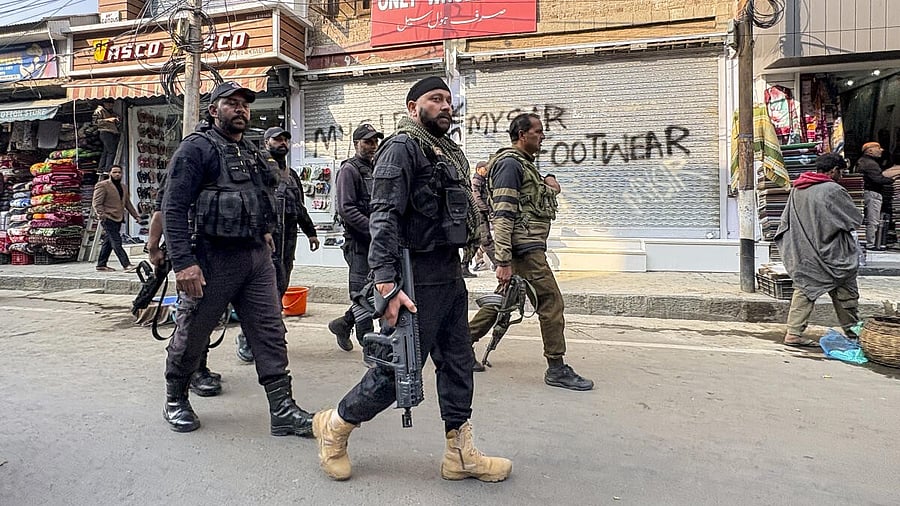
Security personnel stand guard following the arrest of Dr. Adeel (a resident of Wanpora, Kulgam), accused in an interstate and transnational terror module, in Anantnag, Monday, Nov. 10, 2025. The arrest and subsequent terror module bust were results of a joint operation by the Faridabad and Jammu and Kashmir Police.
Credit: PTI Photo
Srinagar: In one of the biggest counter-terror operations in recent years, Jammu and Kashmir Police on Monday said it dismantled an inter-state and transnational terrorist module linked to the proscribed outfits Jaish-e-Mohammad (JeM) and Ansar Ghazwat-ul-Hind (AGuH).
Seven people, including two doctors, were arrested following a series of coordinated raids in Jammu and Kashmir, Haryana and Uttar Pradesh. Police said the operation led to the recovery of around 2,900 kg of IED-making material—a haul large enough to trigger multiple large-scale explosions—besides weapons and ammunition from a hideout in Haryana’s Faridabad.
According to Senior Superintendent of Police (SSP), Srinagar Dr Sundeep Chakravarthy, the investigation began on October 19, when posters bearing JeM insignia were found pasted across the Bunpora-Nowgam area on the outskirts of Srinagar. “The clues gathered during the local inquiry pointed to an organised network operating beyond Jammu and Kashmir,” he said
Among those arrested are two doctors, besides a mosque cleric and several others suspected of providing logistical and financial support to militants based in Pakistan. Investigators said the suspects were part of a “white-collar terror network”—educated individuals who used professional cover and encrypted communication channels to coordinate movements, finances and procurement of materials.
Sources said one of the doctors had rented a flat in Faridabad that served as a storage and assembly site for improvised explosive device (IED) components. The recovery included ammonium nitrate, sulphur, aluminium powder, remote-control circuits, and timers, along with a Chinese Star pistol, a Beretta handgun, and two assault rifles. Police also found laboratory-grade reagents and measuring equipment, indicating systematic preparation for large-scale blasts.
“The operation was the culmination of three weeks of surveillance, involving multiple agencies across states,” said a police official. “It has prevented potential mass-casualty attacks.”
Preliminary investigation suggests that the network received instructions from handlers in Pakistan through encrypted messaging platforms. Investigators are now probing whether the arrested doctors were involved in radicalisation or were used for cover and logistics.
The recovery of nearly three tonnes of explosive precursors—believed to be one of the largest hauls in recent Indian counter-terror history—has triggered a wider security review across Delhi-NCR and Jammu & Kashmir. Special teams are analysing chemical samples to confirm the potency and intended design of the explosives.
The sheer quantity — 2900 kg of explosives— is enough to power multiple high-intensity blasts, capable of causing devastation on a large scale. Senior security officials said the recovery points to the possibility of a major terror plot being foiled, one that could have targeted the National Capital Region (NCR) or other strategic sites in North India.
“This is not a routine recovery — it suggests deep infiltration of terror logistics networks extending beyond J&K. The use of medical professionals as facilitators adds an alarming dimension,” a senior police officer told DH.
Security analysts say the Faridabad seizure may indicate renewed efforts by Pakistan-based groups to re-establish RDX supply chains, even as domestic networks evolve to evade detection.
As the investigation widens, more arrests are likely, and agencies are treating the case as a national security priority — a reminder that despite years of counter-terror successes in Kashmir, the battle has far from ended.
JeM, founded by Masood Azhar in Pakistan in 2000, has been behind several major attacks in Jammu and Kashmir, including the 2019 Pulwama bombing that killed 40 CRPF personnel. Its offshoot, Ansar Ghazwat-ul-Hind (AGuH), emerged in 2017 with ideological links to al-Qaeda and has been mostly active in south Kashmir. Police officials said the current module appeared to combine operatives sympathetic to both groups, working under a shared network of handlers.